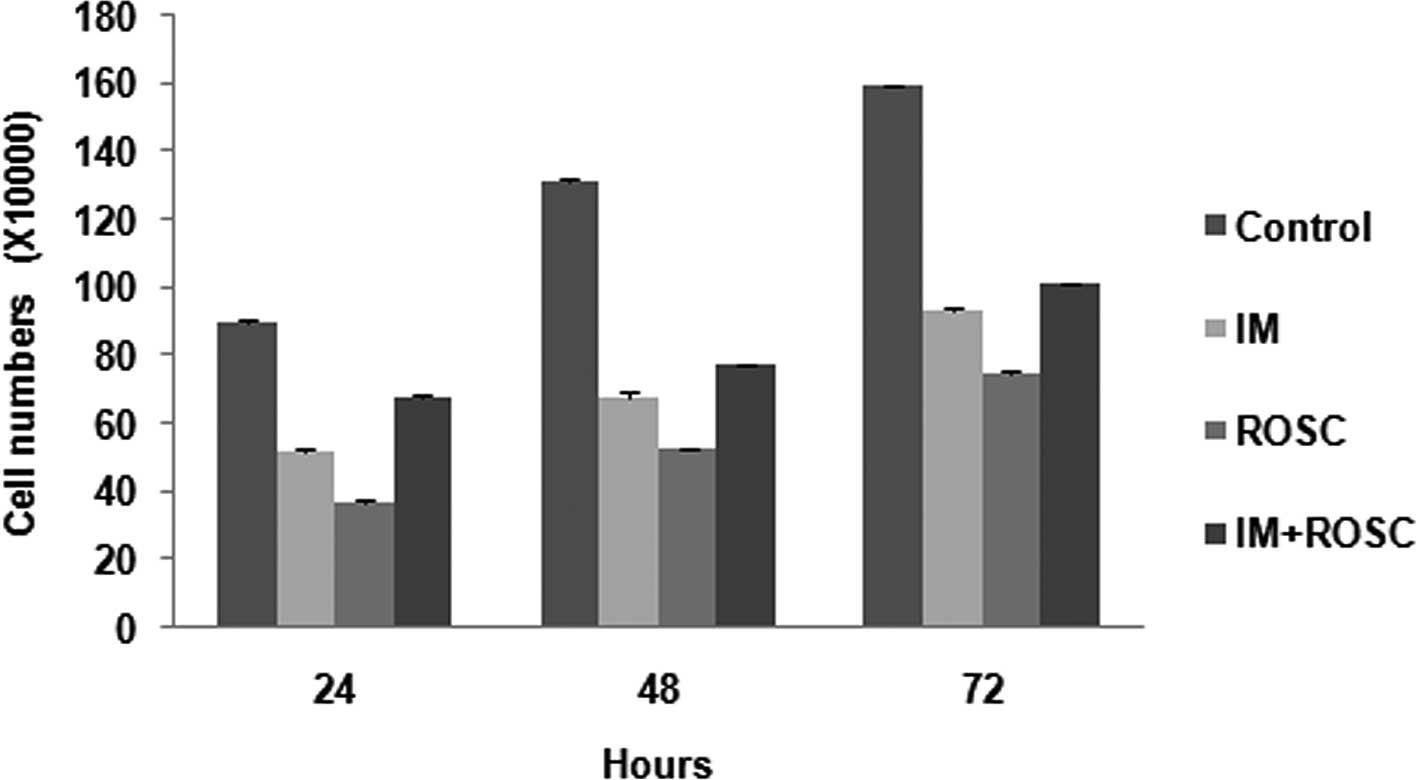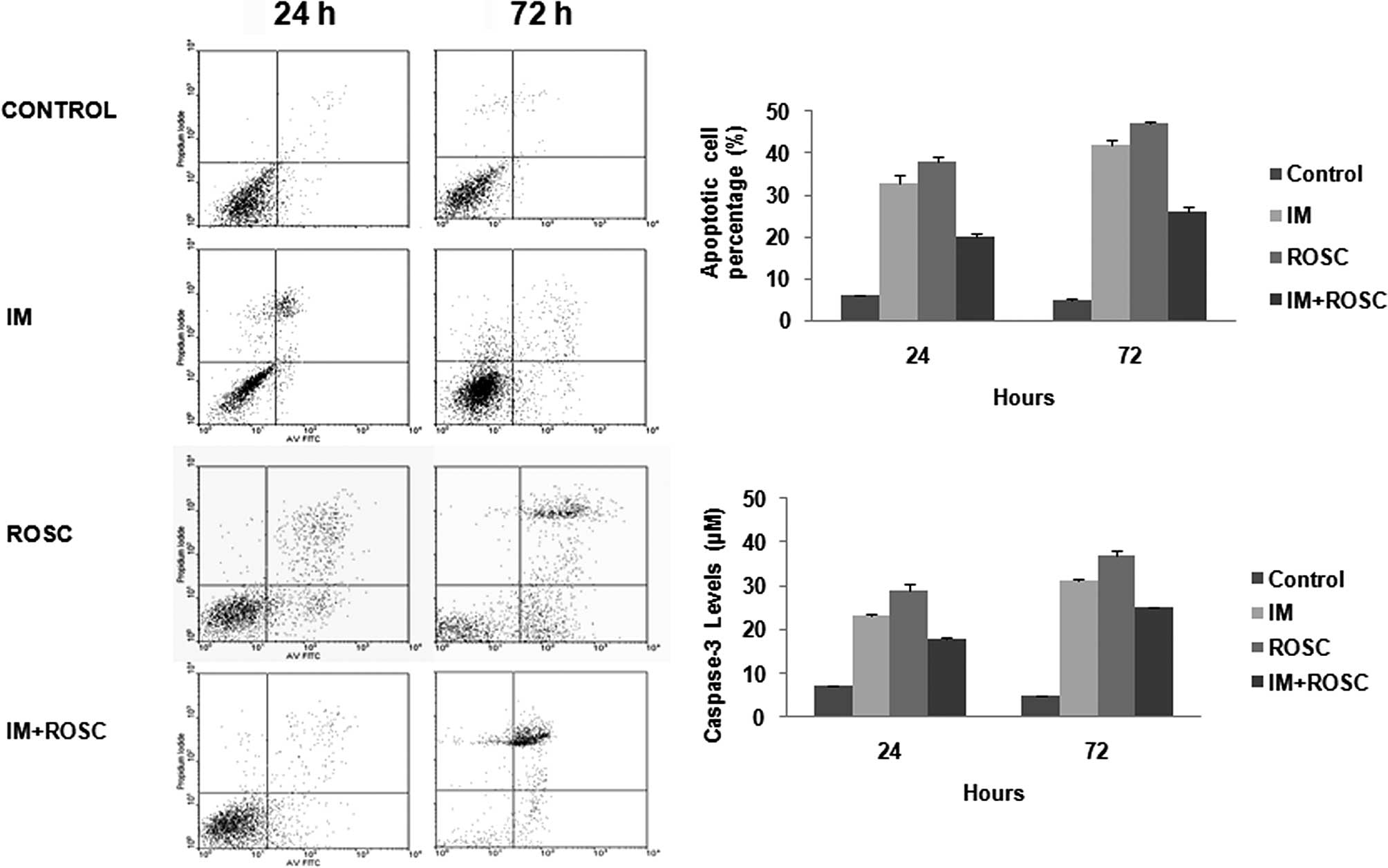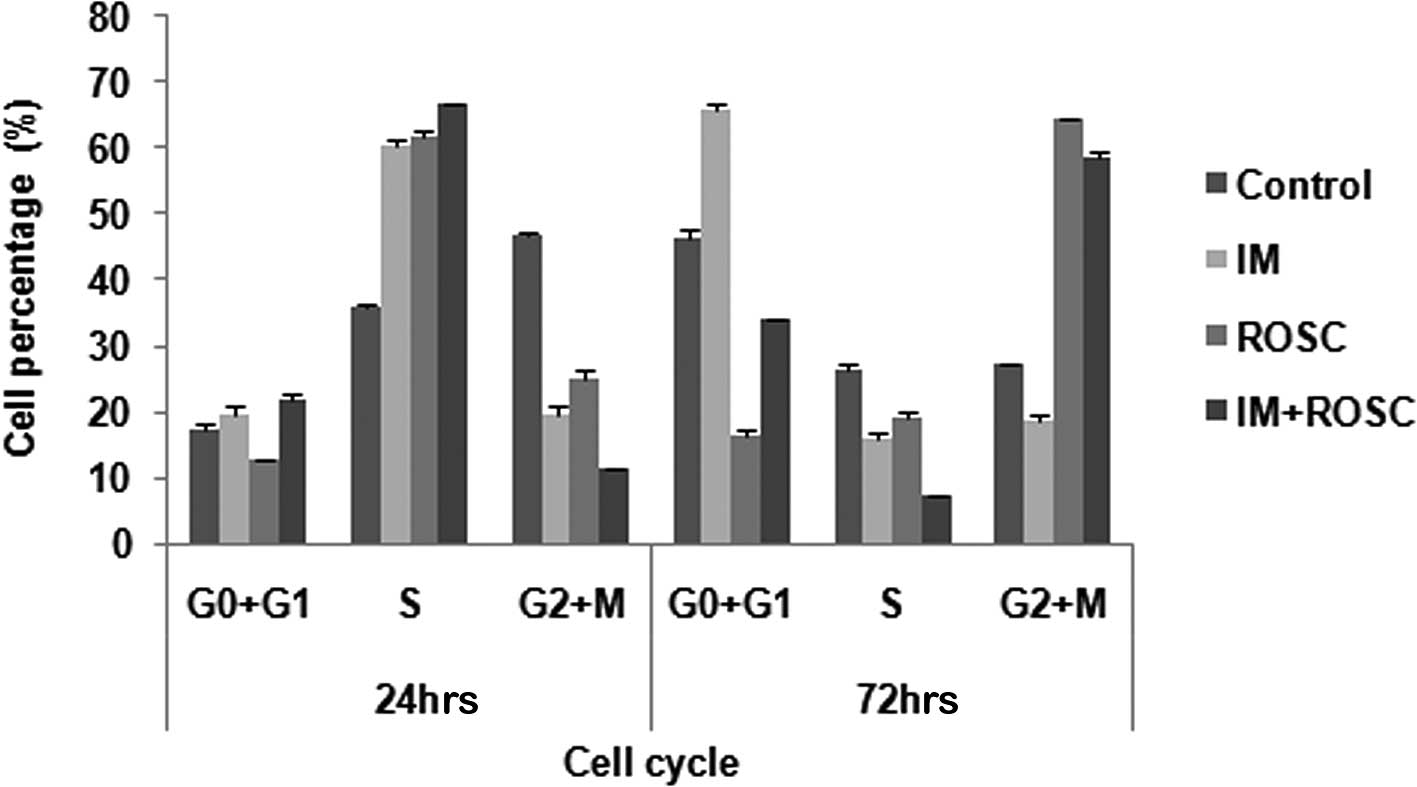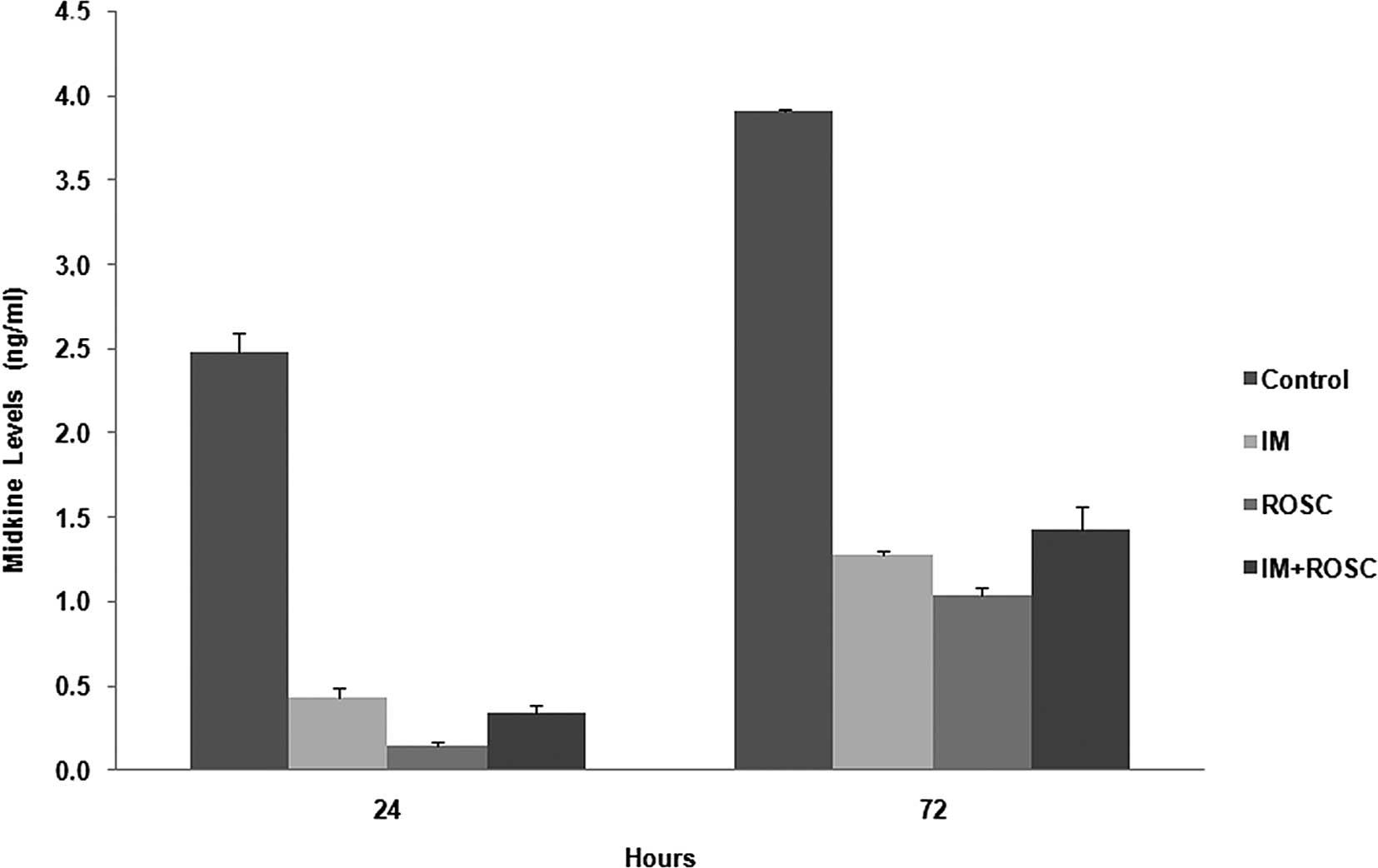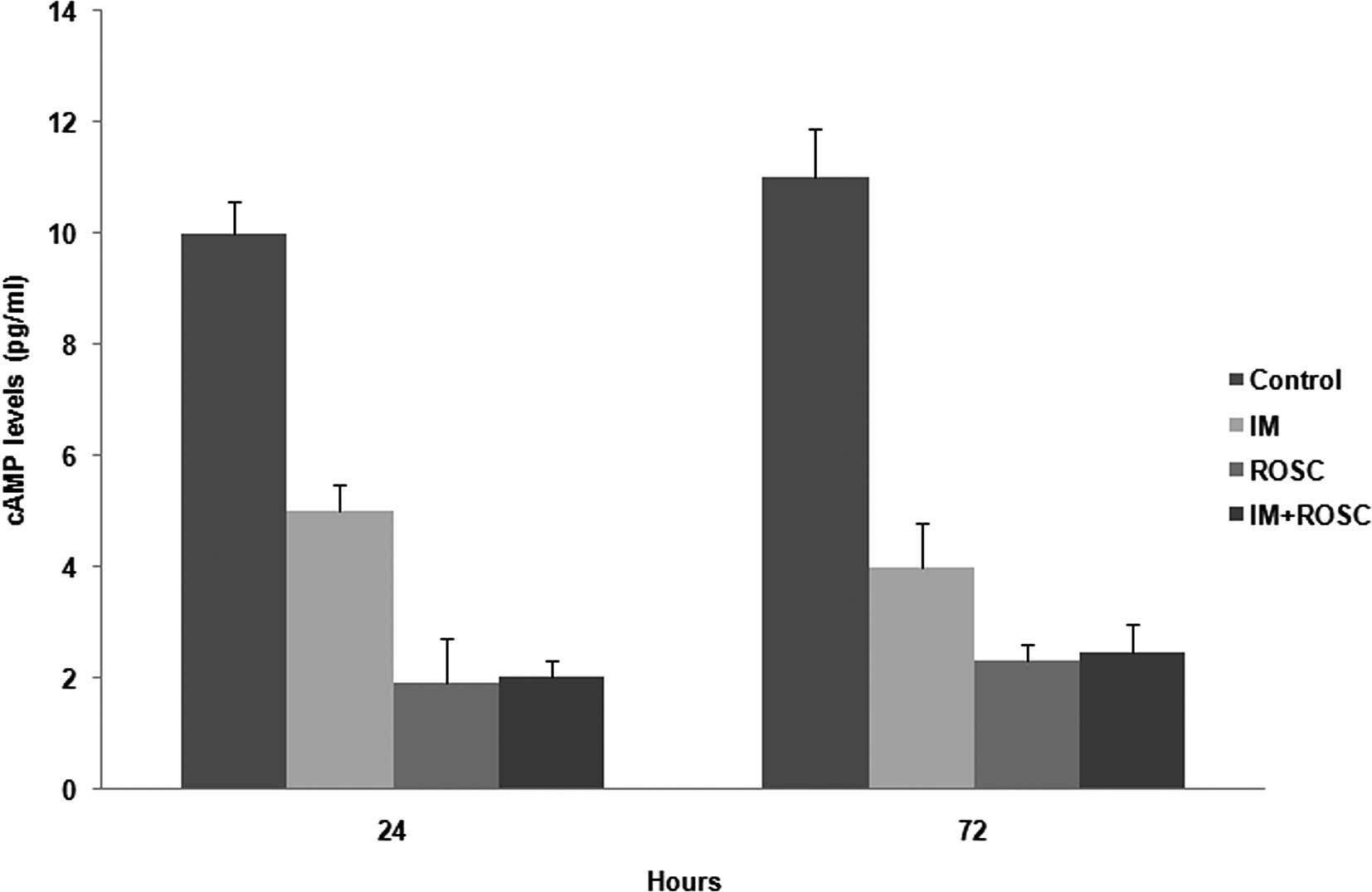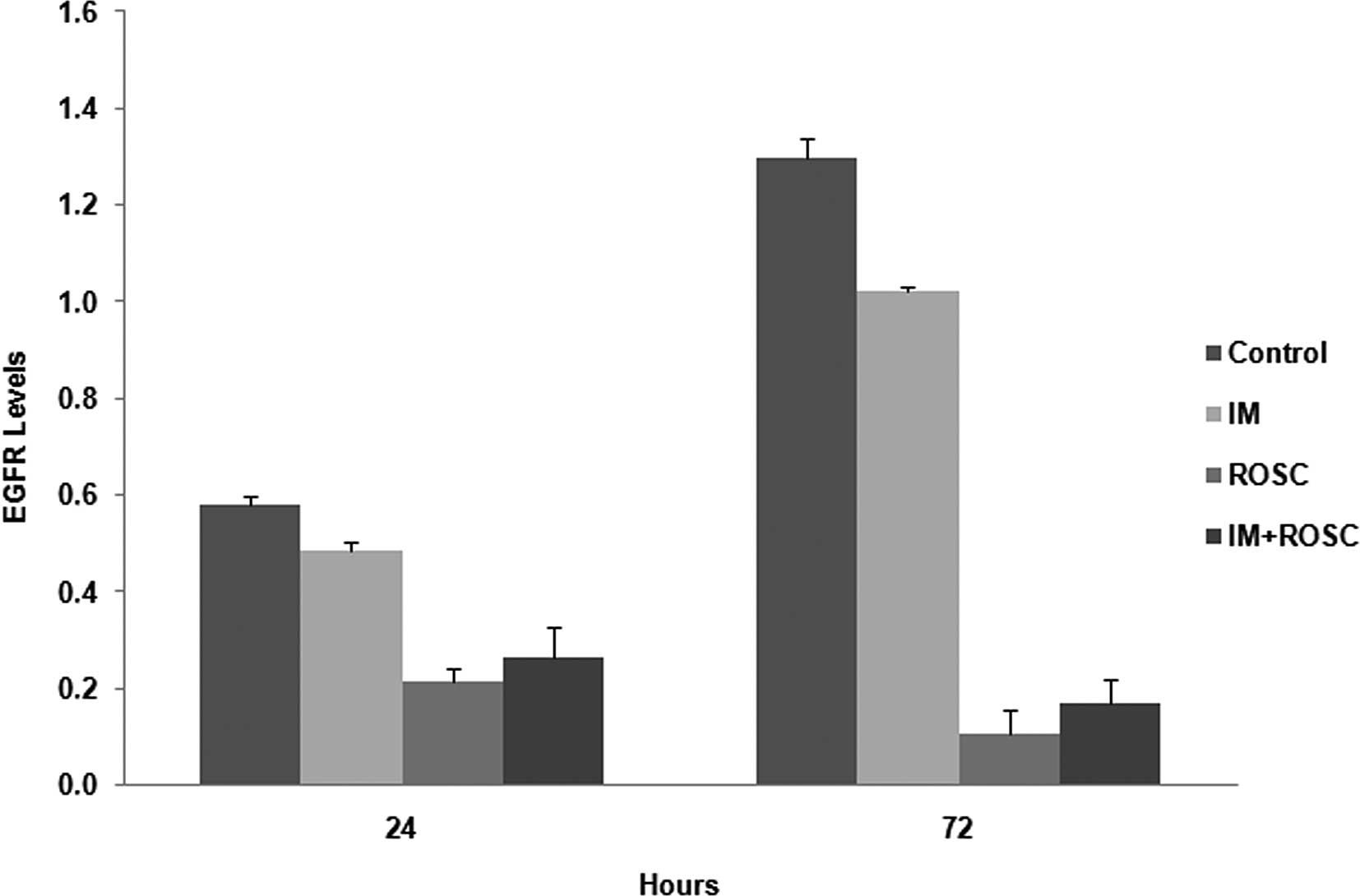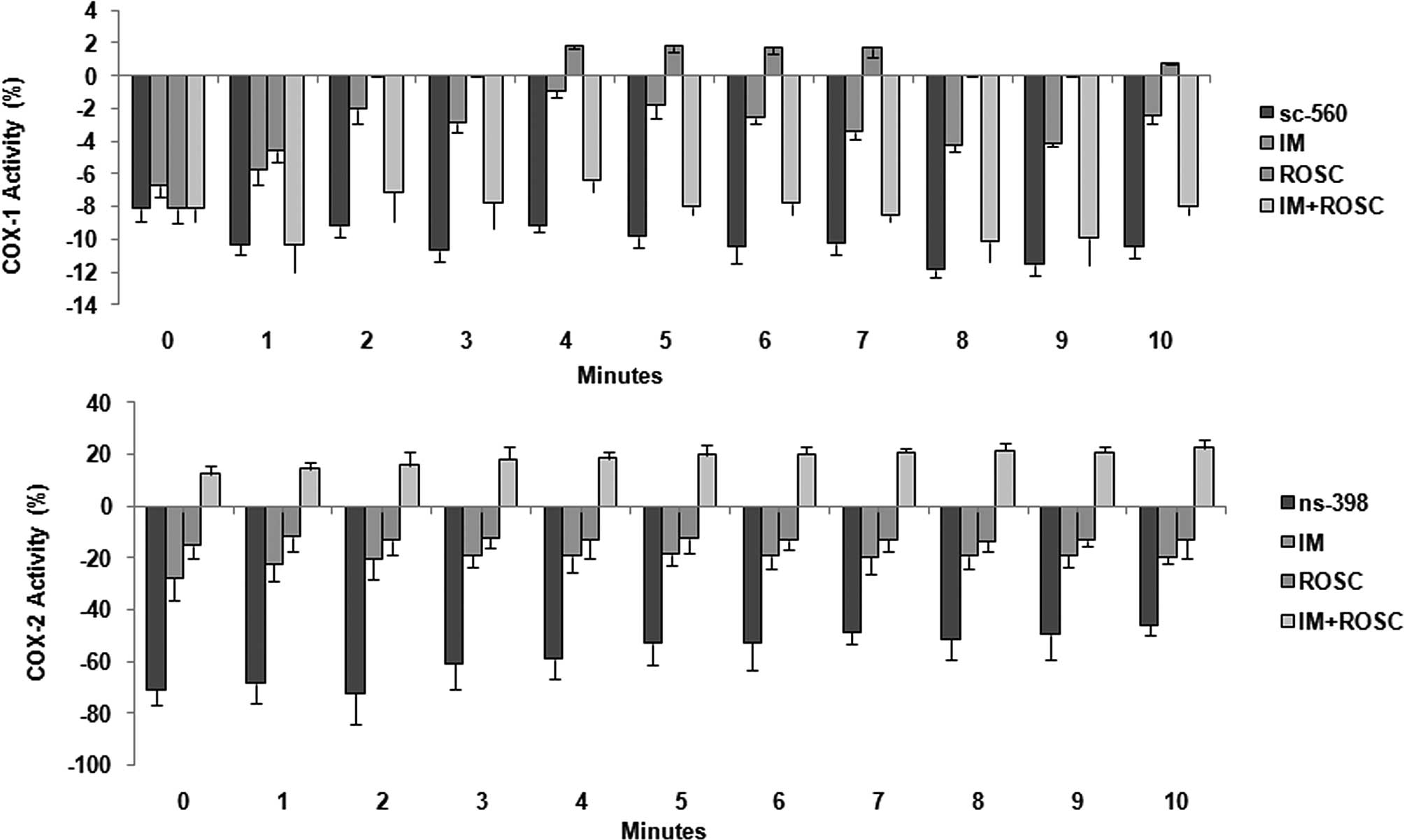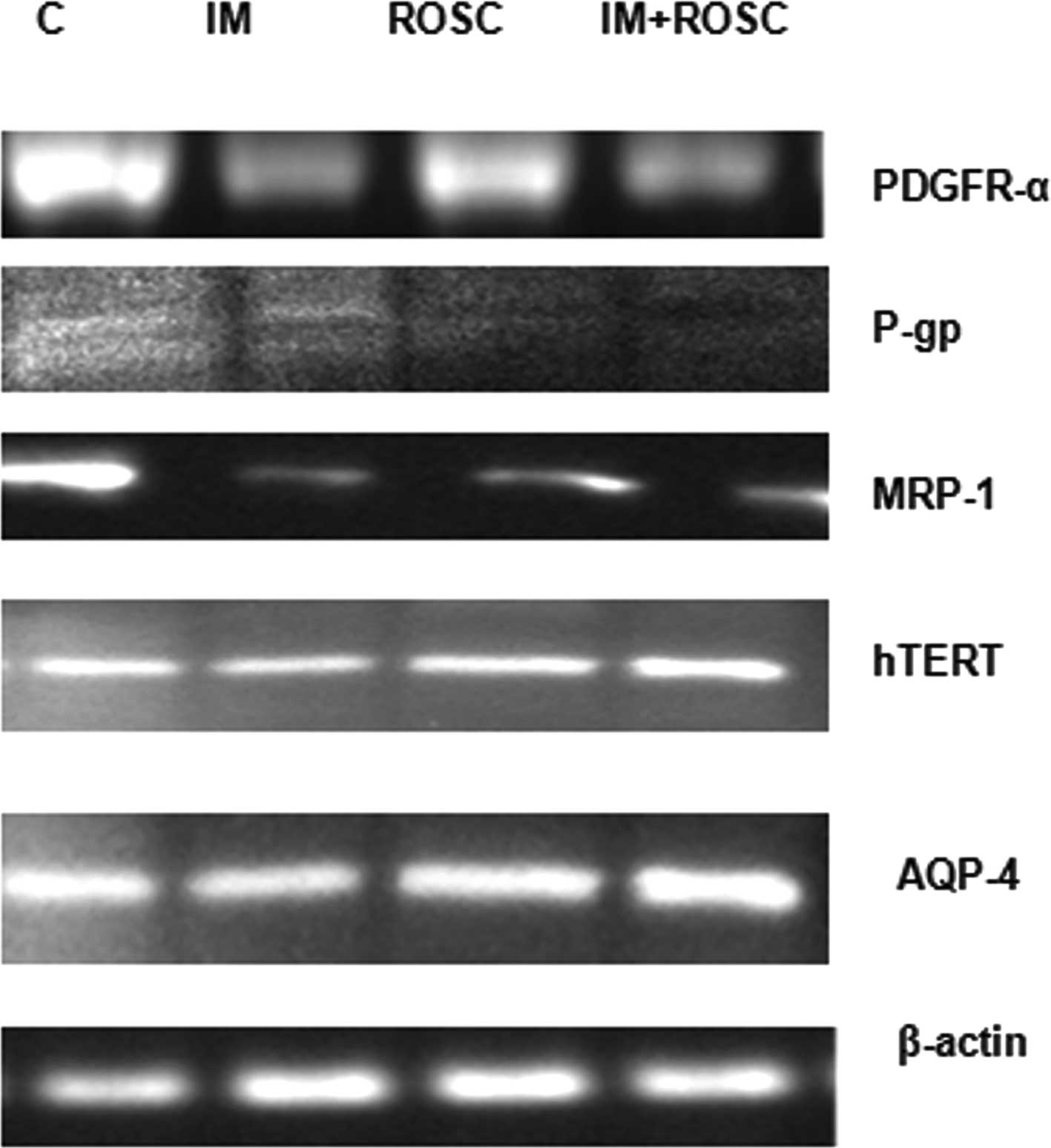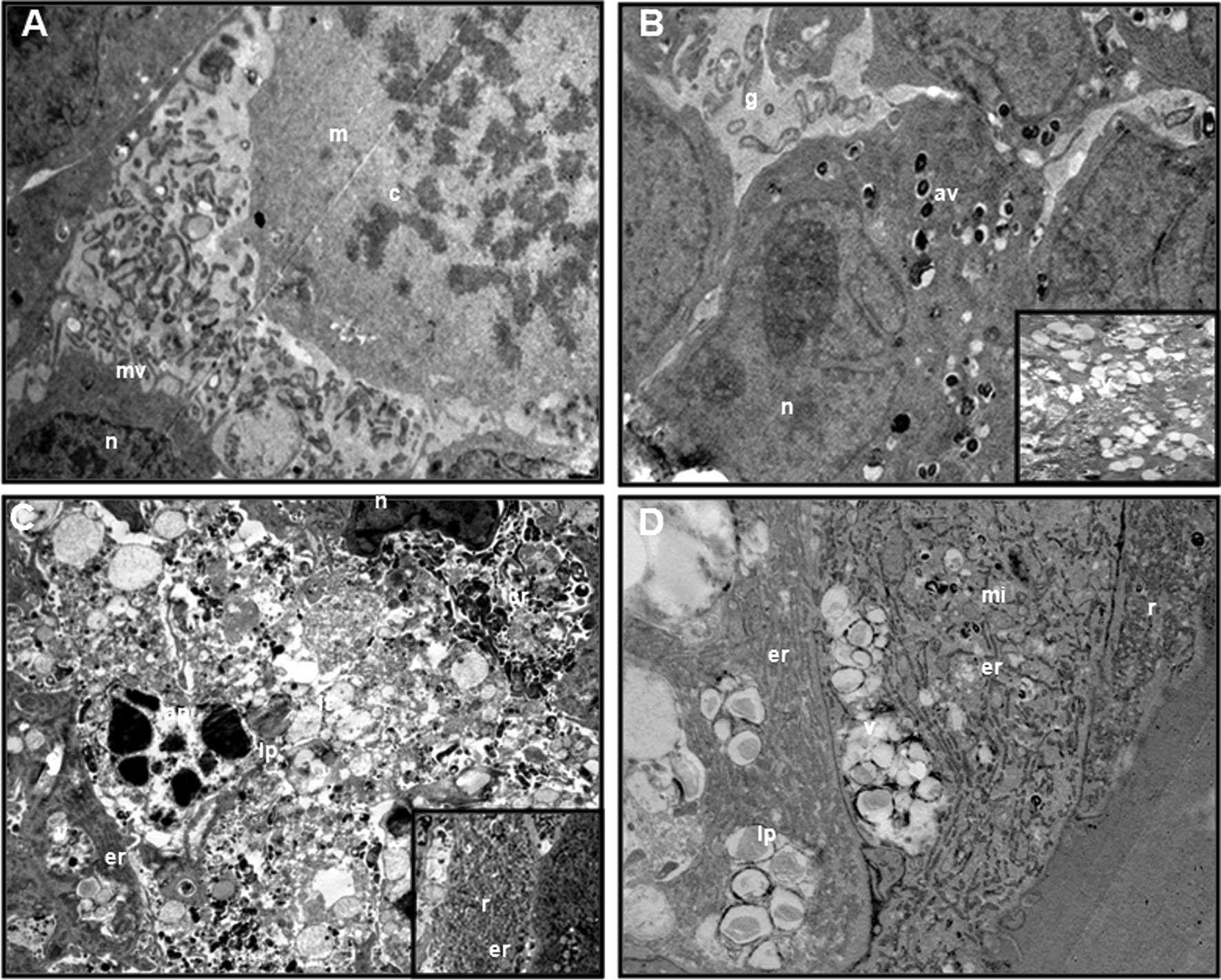|
1
|
Krystof V and Uldrijan S: Cyclin-dependent
kinase inhibitors as anticancer drugs. Curr Drug Targets.
11:291–302. 2010. View Article : Google Scholar : PubMed/NCBI
|
|
2
|
Aldoss IT, Tashi T and Ganti AK:
Seliciclib in malignancies. Expert Opin Investig Drugs.
18:1957–1965. 2009. View Article : Google Scholar
|
|
3
|
Burger K, Mühl B, Harasim T, et al:
Chemotherapeutic drugs inhibit ribosome biogenesis at various
levels. J Biol Chem. 285:12416–12425. 2010. View Article : Google Scholar : PubMed/NCBI
|
|
4
|
Bach S, Knockaert M, Reinhardt J, et al:
Roscovitine targets, protein kinases and pyridoxal kinase. J Biol
Chem. 280:31208–31219. 2005. View Article : Google Scholar : PubMed/NCBI
|
|
5
|
Kim EH, Kim SU, Shin DY, et al:
Roscovitine sensitizes glioma cells to TRAIL-mediated apoptosis by
downregulation of survivin and XIAP. Oncogene. 23:446–456. 2004.
View Article : Google Scholar : PubMed/NCBI
|
|
6
|
Komina O, Nosske E, Maurer M, et al:
Roscovitine, a small molecule CDK inhibitor induces apoptosis in
multidrug-resistant human multiple myeloma cells. J Exp Ther Oncol.
9:27–35. 2011.PubMed/NCBI
|
|
7
|
Dey A, Wong ET, Cheok CF, et al:
R-Roscovitine simultaneously targets both the p53 and NF-kappaB
pathways and causes potentiation of apoptosis:implications in
cancer therapy. Cell Death Differ. 15:263–273. 2008. View Article : Google Scholar : PubMed/NCBI
|
|
8
|
Maggiorella L, Aubel C, Haton C, et al:
Cooperative effect of roscovitine and irradiation targets
angiogenesis and induces vascular destabilization in human breast
carcinoma. Cell Prolif. 42:38–48. 2009. View Article : Google Scholar
|
|
9
|
Ganapathi SB, Kester M and Elmslie KS:
State-dependent block of HERG potassium channels by R-roscovitine:
implications for cancer therapy. Am J Physiol Cell Physiol.
296:C701–C710. 2009. View Article : Google Scholar : PubMed/NCBI
|
|
10
|
Yang SY, Miah A, Pabari A, et al: Growth
Factors and their receptors in cancer metastases. Front Biosci.
16:531–538. 2011. View
Article : Google Scholar : PubMed/NCBI
|
|
11
|
Natoli C, Perrucci B, Perrotti F, et al:
Consorzio Interuniversitario Nazionale per Bio-Oncologia (CINBO).
Tyrosine kinase inhibitors. Curr Cancer Drug Targets. 10:462–483.
2010.PubMed/NCBI
|
|
12
|
Waller CF: Imatinib mesylate. Recent
Results Cancer Res. 184:3–20. 2010. View Article : Google Scholar : PubMed/NCBI
|
|
13
|
Razis E, Selviaridis P, Labropoulos S, et
al: Phase II study of neoadjuvant imatinib in glioblastoma:
evaluation of clinical and molecular effects of the treatment. Clin
Cancer Res. 15:6258–6266. 2009. View Article : Google Scholar : PubMed/NCBI
|
|
14
|
Erguven M, Yazihan N, Aktas E, et al:
Carvedilol in glioma treatment alone and with imatinib in
vitro. Int J Oncol. 36:857–866. 2010. View Article : Google Scholar : PubMed/NCBI
|
|
15
|
Mangiola A, Anile C, Pompucci A, et al:
Glioblastoma therapy: going beyond Hercules Columns. Expert Rev
Neurother. 10:507–514. 2010. View Article : Google Scholar : PubMed/NCBI
|
|
16
|
Declèves X, Bihorel S, Debray M, et al:
ABC transporters and the accumulation of imatinib and its active
metabolite CGP74588 in rat C6 glioma cells. Pharmacol Res.
57:214–222. 2008.PubMed/NCBI
|
|
17
|
Bihorel S, Camenisch G, Lemaire M, et al:
Influence of breast cancer resistance protein (Abcg2) and
p-glycoprotein (Abcb1a) on the transport of imatinib mesylate
(Gleevec) across the mouse blood-brain barrier. J Neurochem.
102:1749–1757. 2007. View Article : Google Scholar : PubMed/NCBI
|
|
18
|
Ozawa T, Brennan CW, Wang L, et al: PDGFRA
gene rearrangements are frequent genetic events in PDGFRA-amplified
glioblastomas. Genes Dev. 24:2205–2218. 2010. View Article : Google Scholar : PubMed/NCBI
|
|
19
|
Muramatsu T: Midkine (MK), the product of
a retinoic acid responsive gene, and pleiotrophin constitute a new
protein family regulating growth and differentiation. Int J Dev
Biol. 37:183–188. 1993.PubMed/NCBI
|
|
20
|
Garver RI, Chan CS and Milner PG:
Reciprocal expression of pleiotrophin and midkine in normal versus
malignant lung tissues. Am J Respir Cell Mol Biol. 9:463–466. 1993.
View Article : Google Scholar : PubMed/NCBI
|
|
21
|
Garver RI, Radford DM, Donis-Keller H, et
al: Midkine and pleiotrophin expression in normal and malignant
breast tissue. Cancer. 74:1584–1590. 1994. View Article : Google Scholar : PubMed/NCBI
|
|
22
|
Konishi N, Nakamura M, Nakaoka S, et al:
Immunohistochemical analysis of midkine expression in human
prostate carcinoma. Oncology. 57:253–257. 1999. View Article : Google Scholar : PubMed/NCBI
|
|
23
|
Mishima K, Asai A, Kadomatsu K, et al:
Increased expression of midkine during the progression of human
astrocytomas. Neurosci Lett. 233:29–32. 1997. View Article : Google Scholar : PubMed/NCBI
|
|
24
|
Torres KE, Castillo G and Horwitz SB: Proc
Am Assoc Cancer Res. 38:5301997.
|
|
25
|
Fan W, Miller MC, Cheng RL, et al:
Induction of apoptosis by low concentrations of Taxol is not
dependent on a G2/M block. Microsc Microanal. 4:1042–1043.
1998.
|
|
26
|
Miller MC III, Johnson KR, Willingham MC,
et al: Apoptotic cell death induced by baccatin III, a precursor of
Taxol, occurs without G2/M arrest. Cancer Chemother Pharmacol.
44:444–452. 1999. View Article : Google Scholar : PubMed/NCBI
|
|
27
|
Yakisich JS, Boethius J, Lindblom IO, et
al: Inhibition of DNA synthesis in human gliomas by roscovitine.
Neuroreport. 10:2563–2567. 1999. View Article : Google Scholar : PubMed/NCBI
|
|
28
|
Fleming IN, Hogben M, Frame S, et al:
Synergistic inhibition of ErbB signaling by combined treatment with
seliciclib and ErbB-targeting agents. Clin Cancer Res.
14:4326–4335. 2008. View Article : Google Scholar : PubMed/NCBI
|
|
29
|
Mohapatra S, Chu B, Wei S, et al:
Roscovitine inhibits STAT5 activity and induces apoptosis in the
human leukemia virus type 1-transformed cell line MT-2. Cancer Res.
63:8523–8530. 2003.PubMed/NCBI
|
|
30
|
Spiegl-Kreinecker S, Buchroithner J,
Elbling L, et al: Expression and functional activity of the
ABC-transporter proteins P-glycoprotein and multidrug-resistance
protein 1 in human brain tumor cells and astrocytes. J Neurooncol.
57:27–36. 2002. View Article : Google Scholar
|
|
31
|
Ding T, Ma Y, Li W, et al: Role of
aquaporin-4 in the regulation of migration and invasion of human
glioma cells. Int J Oncol. 38:1521–1531. 2011.PubMed/NCBI
|
|
32
|
Ibraghimov-Beskrovnaya O: Targeting
dysregulated cell cycle and apoptosis for polycystic kidney disease
therapy. Cell Cycle. 6:776–779. 2007. View Article : Google Scholar : PubMed/NCBI
|
|
33
|
Shukla S, Acharya S, Rajput D, et al:
Telomere-the twilight to immortality. J Assoc Physicians India.
58:553–560. 2010.PubMed/NCBI
|
|
34
|
Marian CO, Cho SK, McEllin BM, et al: The
telomerase antagonist, imetelstat, efficiently targets glioblastoma
tumor-initiating cells leading to decreased proliferation and tumor
growth. Clin Cancer Res. 16:154–163. 2010. View Article : Google Scholar
|
|
35
|
Uziel O, Fenig E, Nordenberg J, et al:
Imatinib mesylate (Gleevec) downregulates telomerase activity and
inhibits proliferation in telomerase-expressing cell lines. Br J
Cancer. 92:1881–1891. 2005. View Article : Google Scholar : PubMed/NCBI
|
|
36
|
Deville L, Hillion J, Pendino F, et al:
hTERT promotes imatinib resistance in chronic myeloid leukemia
cells: therapeutic implications. Mol Cancer Ther. 10:711–719. 2011.
View Article : Google Scholar : PubMed/NCBI
|
|
37
|
Greenhough A, Smartt HJ, Moore AE, et al:
The COX-2/PGE2 pathway: key roles in the hallmarks of cancer and
adaptation to the tumour microenvironment. Carcinogenesis.
30:377–386. 2009. View Article : Google Scholar : PubMed/NCBI
|
|
38
|
Reardon DA, Quinn JA, Vredenburgh J, et
al: Phase II trial of irinotecan plus celecoxib in adults with
recurrent malignant glioma. Cancer. 103:329–38. 2005. View Article : Google Scholar : PubMed/NCBI
|
|
39
|
Du J, Wei N, Guan T, et al: Inhibition of
CDKS by roscovitine suppressed LPS-induced *NO production through
inhibiting NFkappaB activation and BH4 biosynthesis in macrophages.
Am J Physiol Cell Physiol. 297:C742–9. 2009.PubMed/NCBI
|
|
40
|
Vigneron C, Nuttinck F, Perreau C, et al:
Effect of roscovitine, a cdk1 inhibitor, and of the presence of
oocyte on bovine cumulus cell expansion and cyclooxygenase-2
expression. Mol Reprod Dev. 65:114–21. 2003. View Article : Google Scholar : PubMed/NCBI
|
|
41
|
Arunasree KM, Roy KR, Anilkumar K, et al:
Imatinib-resistant K562 cells are more sensitive to celecoxib, a
selective COX-2 inhibitor: role of COX-2 and MDR-1. Leuk Res.
32:855–864. 2008. View Article : Google Scholar : PubMed/NCBI
|
|
42
|
Lambert LA, Qiao N, Hunt KK, et al:
Autophagy: a novel mechanism of synergistic cytotoxicity between
doxorubicin and roscovitine in a sarcoma model. Cancer Res.
68:7966–7974. 2008. View Article : Google Scholar : PubMed/NCBI
|
|
43
|
Hu R, Yan Y, Li Q, et al: Increased drug
efflux along with midkine gene high expression in childhood
B-lineage acute lymphoblastic leukemia cells. Int J Hematol.
92:105–110. 2010. View Article : Google Scholar : PubMed/NCBI
|
|
44
|
Kang HC, Kim IJ, Park JH, et al:
Identification of genes with differential expression in acquired
drug-resistant gastric cancer cells using high-density
oligonucleotide microarrays. Clin Cancer Res. 10:272–284. 2004.
View Article : Google Scholar : PubMed/NCBI
|
|
45
|
Bilir A, Erguven M, Yazihan N, et al:
Enhancement of vinorelbine-induced cytotoxicity and apoptosis by
clomipramine and lithium chloride in human neuroblastoma cancer
cell line SH-SY5Y. J Neurooncol. 100:385–395. 2010. View Article : Google Scholar : PubMed/NCBI
|
|
46
|
Dai LC, Shao JZ, Min LS, et al: Midkine
accumulated in nucleolus of HepG2 cells involved in rRNA
transcription. World J Gastroenterol. 14:6249–6253. 2008.
View Article : Google Scholar : PubMed/NCBI
|
|
47
|
Van Riggelen J, Yetil A and Felsher DW:
MYC as a regulator of ribosome biogenesis and protein synthesis.
Nat Rev Cancer. 10:301–309. 2011.PubMed/NCBI
|
|
48
|
Dai MS, Arnold H, Sun XX, et al:
Inhibition of c-Myc activity by ribosomal protein L11. EMBO J.
26:3332–3345. 2007. View Article : Google Scholar : PubMed/NCBI
|
|
49
|
Lohrum MA, Ludwig RL, Kubbutat MH, et al:
Regulation of HDM2 activity by the ribosomal protein L11. Cancer
Cell. 3:577–587. 2003. View Article : Google Scholar : PubMed/NCBI
|
|
50
|
Zhang Y, Wolf GW, Bhat K, et al: Ribosomal
protein L11 negatively regulates oncoprotein MDM2 and mediates a
p53-dependent ribosomal-stress checkpoint pathway. Mol Cell Biol.
23:8902–8912. 2003. View Article : Google Scholar : PubMed/NCBI
|
|
51
|
Bhat KP, Itahana K, Jin A, et al:
Essential role of ribosomal protein L11 in mediating growth
inhibition-induced p53 activation. EMBO J. 23:2402–2412. 2004.
View Article : Google Scholar : PubMed/NCBI
|
|
52
|
Muller AW: Thermosynthesis as energy
source for the RNA World: a model for the bioenergetics of the
origin of life. Biosystems. 82:93–102. 2005.PubMed/NCBI
|















